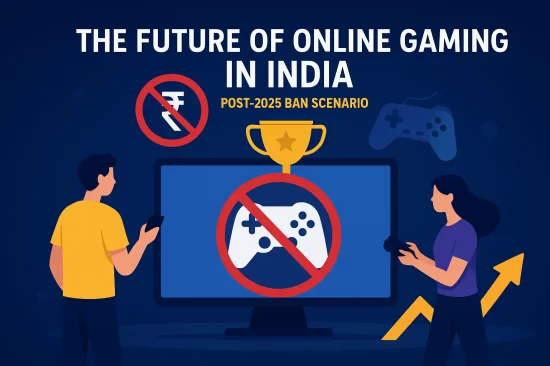The Future of Online Gaming in India After the 2025 Ban

Introduction
India’s online gaming industry has witnessed explosive growth in the last decade, with platforms like Dream11, MPL, RummyCircle, and Zupee attracting millions of users. But with the Online Gaming Bill 2025 banning all real-money gaming, the industry is now at a crossroads. The big question is: What is the future of online gaming in India?
Current Scenario After the Ban
The government’s decision to ban real-money games like fantasy cricket, poker, and rummy was driven by rising financial losses, addiction concerns, and legal challenges. While this has closed doors for paid gaming, it has also opened opportunities in free-to-play, esports, and skill-based formats.
Key Trends Shaping the Future
1. Rise of Free-to-Play Gaming
With cash contests banned, platforms are shifting to free prediction games, quizzes, and reward-based play. Users can still enjoy cricket fantasy and esports, but without financial risk.
2. Esports & Competitive Gaming Boom
India already has over 500 million gamers, and esports tournaments are growing rapidly. Titles like BGMI, Valorant, and FIFA are dominating, attracting sponsorships, viewership, and prize pools.
3. Shift to Global Gaming Platforms
With Indian apps restricted, global companies may tap the market through partnerships and free versions of their games, ensuring users still engage with international gaming trends.
4. Focus on Safe & Regulated Gaming
Instead of gambling-style models, companies will now focus on entertainment-driven experiences with parental controls, in-app purchases, and ad-based monetization.
5. Integration with Cricket & Sports
Even without fantasy leagues, cricket remains India’s biggest gaming driver. Expect interactive cricket simulations, AR/VR gaming, and esports tournaments tied to IPL and international cricket.
Opportunities for the Industry
Esports Careers: Players, casters, and content creators will thrive.
Tech Innovations: AI, VR, and cloud gaming will bring immersive experiences.
Monetization Models: Subscriptions, ads, and brand partnerships will replace betting-style revenue.
Youth Engagement: With India’s young demographic, demand for gaming will remain strong.
Challenges Ahead
Revenue Loss: Industry lost over ₹20,000 crore annually from real-money gaming.One major concern about the future of online gaming is the massive financial risk for players—studies show that Indians lose over ₹20,000 crore annually on real-money gaming.
Unregulated Offshore Platforms: Risk of users moving to unsafe betting apps.
Need for Clear Policies: A lack of balanced regulation may slow innovation.
Final Thoughts
The future of online gaming in India is not dead—it’s evolving. While real-money games are banned, the market will shift towards esports, free-to-play models, skill-based entertainment, and tech-driven innovations. With India’s massive youth population and growing digital adoption, online gaming is set to remain one of the fastest-growing entertainment sectors.
For details on the government’s stance, check our complete Online Gaming Bill 2025 Guide.
📢 Stay tuned with AllCric for updates on the Online Gaming Ban, esports growth, and new ways to enjoy cricket-based games in India.
❓ FAQs
The government banned it to reduce financial losses, protect users from addiction, and prevent unregulated betting.
Esports is booming. Games like BGMI, Valorant, and FIFA are growing fast with tournaments, sponsors, and huge fan bases.
Yes, many apps are shifting to free-to-play formats with rewards, ads, and subscriptions instead of cash betting.
No, they are unregulated and risky. Using them may cause fraud, data theft, or legal issues.
